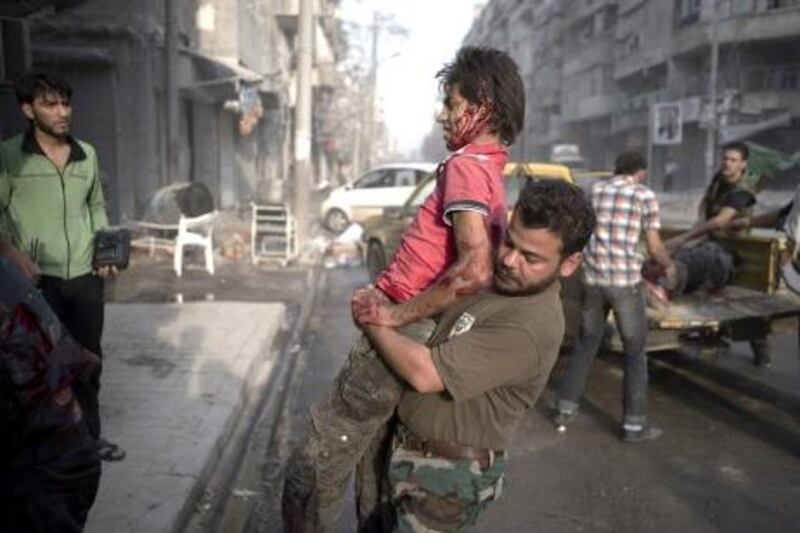DAMASCUS // Amid universally low expectations that United Nations special envoy Lakhdar Brahimi can bring peace to Syria, some grassroots activists nonetheless say he may yet help to steer the country out of a deepening crisis.
The veteran Algerian diplomat replaced Kofi Annan, who resigned in "frustration and disgust" in August. Mr Brahimi described his task as almost impossible and said only last week there was "no prospect for today or tomorrow" that the civil war would end.
But a month after his appointment some activists say that with skill and a large slice of luck Mr Brahimi has a chance of breaking the cycle of violence.
"The situation on the ground is so dire that this might help him make a breakthrough. Even a small one would be important," one said.
The activist met Mr Brahimi last month during the envoy's fact-finding visit to Syria.
At the time it had been reported that Mr Brahimi had a meeting with the officially tolerated political opposition, figures with little credibility inside Syria who are widely seen as regime proxies, condoned by the authorities to show the outside world Syria does tolerate dissent.
While in Damascus however, the UN envoy also met well-connected grassroots activists involved in protests and medical relief efforts.
"If Mr Brahimi can help reduce violence - we are no longer even talking about a complete halt, just to scale it back - then he might be able to make some progress," the activist said.
"He needs a quick win to show his credibility and to give the opposition faith that his process and methods will work. If he can reduce violence and get meaningful numbers of political prisoners freed and returned to their families, that will give us a narrow platform to build on," he said.
Mr Brahimi was appointed special envoy to Syria after Mr Annan's six-point peace plan collapsed. Under the terms of that agreement - signed up to by the president, Bashar Al Assad, and opposition factions - both sides were required to observe a ceasefire, political prisoners were to be freed and negotiations were to begin.
The ceasefire lasted a matter of hours and, despite the presence of UN observers, none of the six points was implemented.
Since the Annan plan failed, violence has only intensified, with air strikes, artillery bombardments and street fighting now routine across much of the country.
Rights groups say upwards of 30,000 people have been killed since the uprising began in March, most of them civilians, and the UN says more than 2.5 million Syrians need humanitarian aid.
According to the activist, Mr Brahimi made it clear the opposition would have to make concessions if the bloodshed were to end.
"I told him we realise that," the activist said. "It will not be easy to convince the street that it needs to compromise after so much suffering, but if we get some progress on violence and prisoners we will have a window of opportunity and we can at least try."
That window would not stay open indefinitely, the activist said, suggesting concrete progress needed to be made before the end of the year.
Anti-Assad campaigners who met Mr Brahimi also agreed to a political process without pre-conditions, the activist said. Many opposition groups, including the Syrian National Council and the rebel Free Syrian Army, have insisted Mr Al Assad's removal would have to come before any talks about a political transition can take place.
"We need to find a rational, realistic way to bring about political change," the activist said. "We are open to a transitional government as long as there is a clear timetable and as long as it involves real presidential elections, monitored independently by the United Nations."
A political analyst in Damascus said the rapidly worsening situation might work to Mr Brahimi's advantage.
"This crisis was never going to end until it had reached every corner or every house in Syria and we are now at that point," the analyst said. "It is a small chance but if Brahimi can put together the right deal, with the right international backing, a political transition could happen."
However. another opposition figure in Damascus dismissed suggestions such a deal could be struck, and said both the fractured opposition and Syrian regime were pretending to cooperate with Mr Brahimi without being willing or able to commit to even small compromises.
"The equation that got us to this point has not changed, the opposition will not stop until Assad and his regime has gone, and the regime will not leave until it is physically forced to leave," said the dissident, who was recently freed from jail.
"The latest UN peace initiative will fail, we are heading into a full scale civil war and there is no end in sight," he said.





